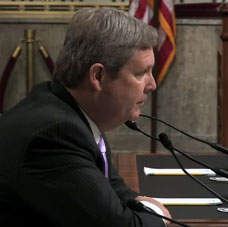 The 59th Speaker of the House, who played an active role in the development of current energy policy, spoke about leadership and the importance of the nation’s energy security during an appearance at the GROWMARK, FS System “Gold Rush” event in East Peoria, Illinois to introduce re-formulated Dieselex Gold.
The 59th Speaker of the House, who played an active role in the development of current energy policy, spoke about leadership and the importance of the nation’s energy security during an appearance at the GROWMARK, FS System “Gold Rush” event in East Peoria, Illinois to introduce re-formulated Dieselex Gold.
Dennis Hastert, a native of Illinois, told the group that growing up on a farm taught him the responsibility and leadership that helped serve him well in public life. He spoke of being an “accidental Speaker” and becoming a “war-time Speaker” after 9/11.
When asked by a member of the audience about energy policy, Hastert was adamant about the importance of renewable fuels and ethanol in particular. “We need to use ethanol,” he said. “I fought for ethanol from the time that I was in Congress for 15 years and finally got through the Ways and Means Committee along with a guy named Nussle from Iowa and we got ethanol with the tax credits so it could be a viable product. If we sit back and don’t do anything about it, we’re going to lose it.”
Listen to Speaker Hastert’s address to the FS Gold Rush event: Speaker of the House Dennis Hastert
I also had the opportunity to interview Hastert after his address about his comments, energy and farm policy. Listen to that interview here: Dennis Hastert Interview
See photos from the FS Dieselex Gold Rush event


 The
The 
 The
The  In this edition of “The Ethanol Report,”
In this edition of “The Ethanol Report,” 
 The importance of biofuels to rural development was a focus of the first Farm Bill hearing by the Senate Committee on Agriculture this week.
The importance of biofuels to rural development was a focus of the first Farm Bill hearing by the Senate Committee on Agriculture this week. Fifteen percent ethanol blended motor fuel has gotten one step closer to commercial availability with
Fifteen percent ethanol blended motor fuel has gotten one step closer to commercial availability with 
 “American motorists are looking down the barrel of $5 a gallon gasoline this summer, all while foreign strongmen and dictators threaten to drive prices up even more by shutting down oil supplies. And yet we have the answer to this right here in front of us with American ethanol,” said Tom Buis, CEO of Growth Energy. “Ethanol is trading at about 75 cents a gallon cheaper than gasoline. We ought to be giving motorists here at home more choices at the pump. The choices are simple — stay chained to the whims of an Iranian strongman,or invest in clean, renewable, American-made energy with ethanol.”
“American motorists are looking down the barrel of $5 a gallon gasoline this summer, all while foreign strongmen and dictators threaten to drive prices up even more by shutting down oil supplies. And yet we have the answer to this right here in front of us with American ethanol,” said Tom Buis, CEO of Growth Energy. “Ethanol is trading at about 75 cents a gallon cheaper than gasoline. We ought to be giving motorists here at home more choices at the pump. The choices are simple — stay chained to the whims of an Iranian strongman,or invest in clean, renewable, American-made energy with ethanol.”